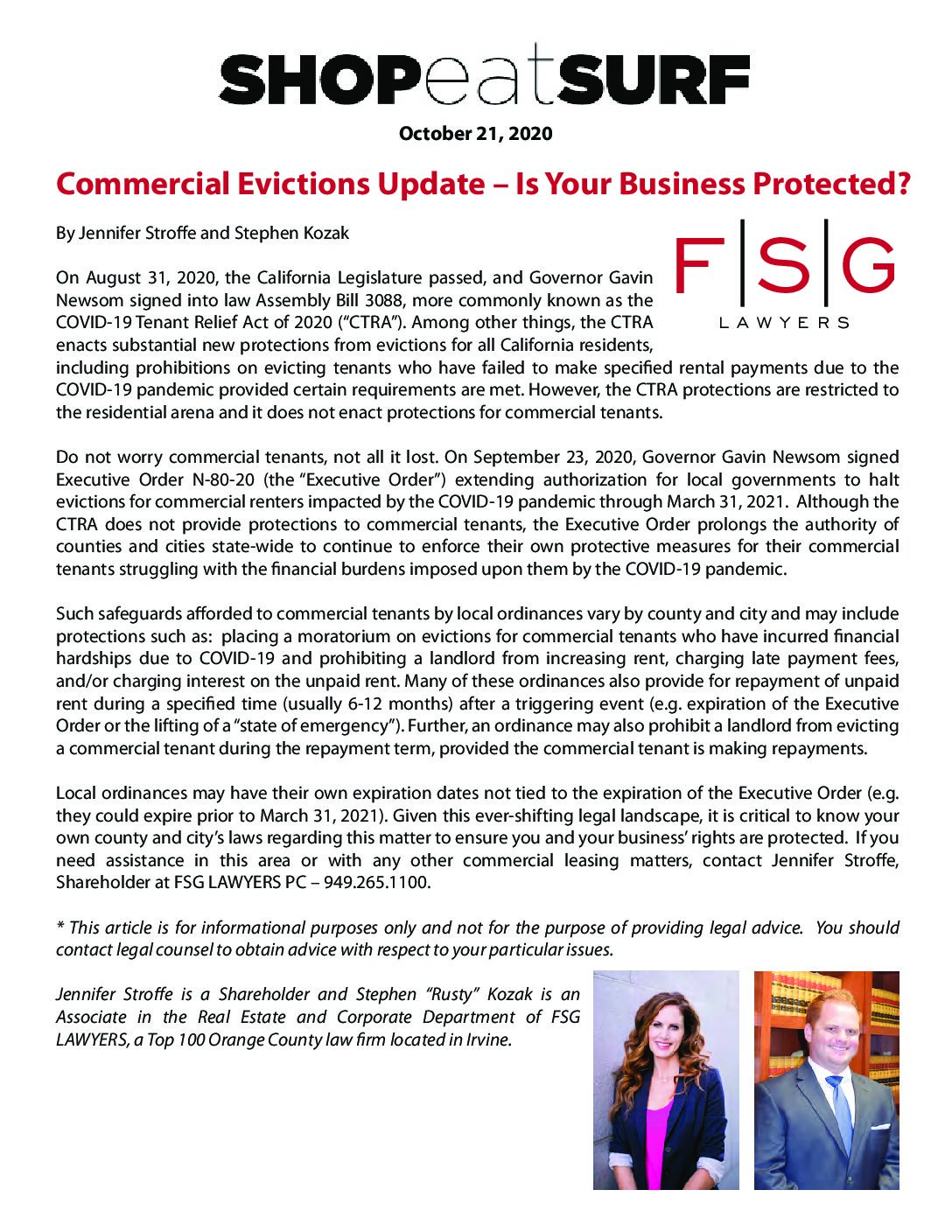Recent News
- Jennifer Stroffe selected to “Southern California Super Lawyers”
- Article – Commercial Evictions Update – Is Your Business Protected?
- Article – Tenants – Think Twice Before Signing That AIR Lease Form*
- Article “Agreements with Sales Representatives”
- Misclassification of an employee or a contractor can have severe tax and other consequences for the employer.
- Article “Classifying Workers: Contractors or Employees?”
- Friedman Stroffe & Gerard, P.C. again selected as one of “Top Orange County Law Firms”
- FSG’s Jim Stroffe featured in Orange County Business Journal’s “Law Firms Special Report”
Article – Commercial Evictions Update – Is Your Business Protected?
* As published in “Shop-Eat-Surf,” October 21, 2020
On August 31, 2020, the California Legislature passed, and Governor Gavin Newsom signed into law Assembly Bill 3088, more commonly known as the COVID-19 Tenant Relief Act of 2020 (“CTRA”). Among other things, the CTRA enacts substantial new protections from evictions for all California residents, including prohibitions on evicting tenants who have failed to make specified rental payments due to the COVID-19 pandemic provided certain requirements are met. However, the CTRA protections are restricted to the residential arena and it does not enact protections for commercial tenants.
Do not worry commercial tenants, not all it lost. On September 23, 2020, Governor Gavin Newsom signed Executive Order N-80-20 (the “Executive Order”) extending authorization for local governments to halt evictions for commercial renters impacted by the COVID-19 pandemic through March 31, 2021. Although the CTRA does not provide protections to commercial tenants, the Executive Order prolongs the authority of counties and cities state-wide to continue to enforce their own protective measures for their commercial tenants struggling with the financial burdens imposed upon them by the COVID-19 pandemic.
Such safeguards afforded to commercial tenants by local ordinances vary by county and city and may include protections such as: placing a moratorium on evictions for commercial tenants who have incurred financial hardships due to COVID-19 and prohibiting a landlord from increasing rent, charging late payment fees, and/or charging interest on the unpaid rent. Many of these ordinances also provide for repayment of unpaid rent during a specified time (usually 6-12 months) after a triggering event (e.g. expiration of the Executive Order or the lifting of a “state of emergency”). Further, an ordinance may also prohibit a landlord from evicting a commercial tenant during the repayment term, provided the commercial tenant is making repayments.
Local ordinances may have their own expiration dates not tied to the expiration of the Executive Order (e.g. they could expire prior to March 31, 2021). Given this ever-shifting legal landscape, it is critical to know your own county and city’s laws regarding this matter to ensure you and your business’ rights are protected. If you need assistance in this area or with any other commercial leasing matters, contact Jennifer Stroffe, Shareholder at FSG LAWYERS PC – 949.265.1100.
This article is for informational purposes only and not for the purpose of providing legal advice. You should contact legal counsel to obtain advice with respect to your particular issues.
Jennifer Stroffe is a Shareholder in the Real Estate and Corporate Department of Friedman Stroffe and Gerard PC, a Top 100 Orange County law firm located in Irvine.

